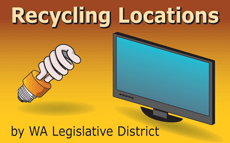Regulations, oversight, and lessons learned from Total Reclaim
Owners of Total Reclaim, the oldest and largest Seattle-area electronics recycler, were sentenced to prison for "conspiracy to commit wire fraud." According to the U.S. Attorney's April 23, 2019 news release, Total Reclaim's fraud "includes lies to customers and auditors, the falsification of hundreds of documents, millions of dollars in ill-gotten gains, and a cover-up after the fraud was discovered. But this offense stands apart from the typical fraud because the greatest damage is not measured in dollars and cents. Rather, it lies in the health consequences that resulted from defendants’ calculated choice to prioritize their own economic well-being over the health of faceless foreign workers."
Unlike Europe, Canada, and most OECD nations, the U.S. has not ratified the U.N. Basel Convention on the Control of Transboundary Movements of Hazardous Wastes and Their Disposal. The "Basel Convention" is an international trade agreement that restricts the trade of hazardous wastes (including electronic wastes) between more developed countries and less developed countries. Since the U.S. is not a party to the Basel Convention, we are forced to rely on other means to ensure that electronics recycling is done in a way that is protective of human health and the environment – both here in the U.S. and in other nations.
BAN, the Basel Action Network, has been sounding the alarm on e-waste for years. Their 2002 documentary Exporting Harm was a wake-up call to the dangers of exporting electronics for recycling. Their e-Stewards standard remains the strongest, cleanest responsible electronics recycling certification program in the U.S. But how many electronics recyclers in the U.S. are members of e-Stewards or adhere to the Standard? Or a lesser standard, or no recycling standard at all?
25 states have electronics recycling laws, though none come close to the program implemented in the state of Washington. The authors of the Washington state electronics stewardship law worked tirelessly to require stringent standards for the recycling program, but due to provisions in the interstate commerce clause, were unable to restrict the export of electronic equipment and were unable to require that recycling be done in our own country. Instead, the electronics producers who pay for the E-Cycle Washington EPR program decided, voluntarily, to require the recyclers in their program to meet the "Preferred Performance Standards" for recycling electronic equipment.
These standards (PDF) provide an additional layer of oversight beyond what is required by existing state and federal law for recycling electronics – requiring annual independent third party audits; requiring that downstream vendors conform with all of the performance standards; and requiring that each transit and recipient country legally accept imports of such materials of concern.
In the absence of strong federal and international oversight, the lesson to be learned from Total Reclaim is the importance of downstream due diligence – not only for electronics but for other recyclable materials as well. The U.S. can and should do better in protecting human health and the environment.
